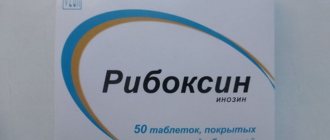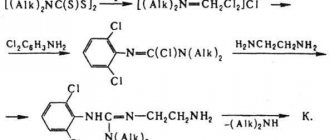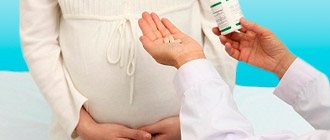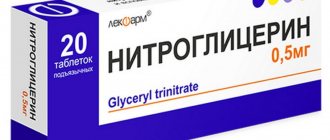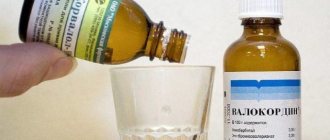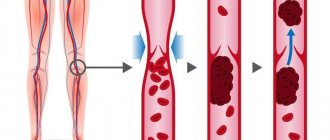Pharmacological properties of the drug Riboxin
Pharmacodynamics. Riboxin is an anabolic drug that has antihypoxic and antiarrhythmic effects. It is a precursor of ATP, is directly involved in glucose metabolism and promotes metabolism activation under hypoxic conditions and in the absence of ATP. The drug activates the metabolism of pyruvic acid to ensure the normal process of tissue respiration and promotes the activation of xanthine dehydrogenase. Riboxin has a positive effect on metabolism in the myocardium, in particular, it increases the energy balance of cells, stimulates the synthesis of nucleotides, and increases the activity of a number of Krebs cycle enzymes. The drug normalizes the contractile activity of the myocardium and promotes more complete relaxation of the myocardium in diastole due to the ability to bind calcium ions that penetrate into cells during their excitation, and activates tissue regeneration (especially the myocardium and the mucous membrane of the digestive tract). Pharmacokinetics. When administered intravenously, Riboxin is quickly distributed in tissues, metabolized in the liver, where it is completely utilized in the biochemical reactions of the body. It is excreted mainly in urine.
Therapeutic effect
Riboxin has a pronounced antihypoxic effect, regulates metabolic processes and prevents heart rhythm disturbances in various vascular pathologies. The drug restores the nutrition and energy of the myocardium, improves blood flow in the coronary vessels, and treats the consequences of ischemia.
Inosine has a systemic effect on the body. The therapeutic effect increases over time.
- Penetrating into the blood, it is actively involved in glucose metabolism, stimulates tissue respiration and ATP synthesis.
- Prevents the negative consequences of oxygen starvation of cells under hypoxic conditions.
- Significantly increases the strength of heart contractions, improves myocardial contractility, preventing circulatory disorders, the development of tachycardia, bradycardia and other types of arrhythmia.
- Slows down platelet aggregation, improves blood fluidity.
- Promotes tissue regeneration, including gastrointestinal mucosa and muscles.
Riboxin quickly dissolves and is absorbed in the stomach cavity and actively interacts with blood proteins. In the liver, the active substance is converted to glucoronic acid, which is oxidized without releasing toxic metabolites. A small part of the drug is excreted through the kidneys and intestines. The drug is not retained or deposited in the body.
Indications for use of the drug Riboxin
Complex treatment of coronary artery disease (condition after myocardial infarction, angina pectoris), heart rhythm disturbances caused by the use of cardiac glycosides, treatment of cardiomyopathies of various origins, myocarditis (due to physical overload), liver diseases (hepatitis, cirrhosis of the liver, fatty liver), urocoproporphyria; prevention of leukopenia during irradiation. As a means of improving visual function, Riboxin is used for open-angle glaucoma with normalized (with the help of antihypertensive drugs) intraocular pressure.
Indications
Riboxin is most often prescribed in cardiology:
- in complex therapy of angina pectoris, coronary insufficiency and other signs of coronary heart disease;
- to improve the physical condition of patients who have had a heart attack;
- to eliminate the consequences of intoxication caused by cardiac glycosides;
- for cardiac arrhythmias of various etiologies;
- for cardiomyopathy, myocarditis, coronary atherosclerosis;
- congenital or acquired heart pathologies of rheumatic origin;
- myocardial dystrophy due to grueling physical activity, infection or endocrine disorder.
Due to its properties to improve metabolism and tissue regeneration, the drug is used in the treatment of various pathologies:
- for cirrhosis, hepatosis, hepatitis, alcoholic and drug-induced liver damage;
- in the complex treatment of gastric and small intestinal ulcers;
- with open-angle glaucoma without pressure disturbances inside the eye;
- to normalize blood composition and eliminate the effects of radiotherapy or radiation sickness.
Riboxin's ability to activate tissue respiration and normalize muscle function is used to help with high physical exertion. Athletes and fitness center visitors take the drug to improve well-being and increase endurance during intense training. According to reviews, it helps reduce shortness of breath, reduces fatigue, and helps runners and athletes achieve better results.
Use of the drug Riboxin
Tablets: orally before meals in a daily dose of 0.6–2.4 g. For the first time, take 0.6–0.8 g/day (0.2 g 3–4 times a day), and if well tolerated, increase the dose for 2–3 days up to 1.2 g/day in 3 divided doses and up to 2.4 g/day. The course of treatment lasts from 4 weeks to 1.5–3 months. For urocoproporphyria, Riboxin is taken in a daily dose of 0.8 g (0.2 g 4 times a day) daily for 1–3 months. Injection. Adults and older children are prescribed intravenous drip or bolus. Initially, 200 mg (10 ml of 2% solution) is administered once a day, then, if well tolerated, up to 400 mg (20 ml of 2% solution) 1–2 times a day. The course of treatment is determined individually (on average 10–15 days). When administered drip into a vein, 2% solution of the drug is diluted in 5% solution of glucose or isotonic solution of sodium chloride (up to 250 ml). The drug is administered slowly, 40–60 drops per minute. In case of acute cardiac arrhythmias, jet administration in a single dose of 200–400 mg (10–20 ml of 2% solution) is possible.
Composition and dosage forms
The active ingredient of Riboxin is inosine. It is a precursor to ATP (adenosine triphosphate), without which proper absorption of glucose is impossible. The drug is produced in oral form and solutions for parenteral injection.
- Hard-coated tablets: round, yellow, containing 200 mg of inosine each. Packaged in metal or plastic blisters of 10 pcs. Sold in packs of 1–5 blisters.
- Gelatin capsules Riboxin Lect of a similar dosage 200 mg. Packed in 20–50 pieces.
- Aqueous 2% transparent solution in glass ampoules with a capacity of 5 and 10 ml. Intended for intravenous administration. Packaged in cardboard packages of 10 ampoules.
In addition to inosine, Riboxin contains auxiliary compounds. In oral forms it is:
- sucrose;
- starch;
- titanium dioxide;
- stearic acid;
- glycerol;
- dyes.
The injectable drug contains sodium hydroxide and hexamethylenetetramine.
Riboxin during pregnancy
The birth of a new life is an amazing process, accompanied by not the most pleasant conditions, including shortness of breath, nausea and rapid heartbeat. Such symptoms often indicate malfunctions in the female body. In the old days, to get rid of such ailments, the pregnant woman was bled and applied with leeches. Modern medicine has more civilized and effective methods of assistance: a doctor monitoring the course of pregnancy will most likely prescribe pharmaceuticals that normalize the functioning of the organs of the mother and child. Among the most popular is Riboxin during pregnancy. Let's try to understand the advisability of using this medicine by expectant mothers.
What is Riboxin?
Riboxin is a synthetic drug related to anabolic drugs. The nature of anabolic steroids allows us to call these compounds the building blocks of the body, because their active substances are involved in the formation and restoration of tissues and muscles.
Riboxin is very well absorbed by the body, because its active substance inosine, entering the cell, nourishes it, fills it with energy, and forces it to work actively. Thus, at the cellular level, Riboxin stimulates protein synthesis, and therefore metabolic processes. This has a positive effect on all human vital functions, including his resistance to diseases. Is it necessary to say what therapeutic effect the medicine has on those who need to regain strength after a long illness or heavy load?
Riboxin is also indispensable for people suffering from heart disease. The latter is most often caused by a lack of oxygen in cells and tissues. Thanks to its antihypoxic effect, the drug at the cellular level increases the ability to carry oxygen, which means it improves blood circulation and prevents irreversible changes in the cells of the heart muscle, that is, myocardial infarction.
Why can a doctor prescribe Riboxin during pregnancy?
A good metabolism is the key to a healthy pregnancy, so anabolic steroids, and in particular Riboxin, are especially useful for pregnant women. During this period, the load on the body increases greatly: body weight increases, metabolism increases, and therefore changes occur in the functioning of the cardiovascular system. The number of heart beats sometimes reaches eighty per minute at rest at normal body temperature. This is understandable, because the heart needs to work several times more intensely so that there are enough nutrients and energy for two. That's why expectant mothers so often suffer from tachycardia. If at the same time there is also insufficient energy supply to some organs, oxygen starvation may occur; in this case, the doctor again prescribes Riboxin during pregnancy, which helps prevent the risk of developing hypoxia in the fetus.
The drug is also effective in the fight against chronic gastritis. an integral companion of almost every pregnancy. The medicine restores gastric secretion, which in turn reduces the unpleasant symptoms of nausea, normalizes stool and improves the functioning of the entire gastrointestinal tract. Usually, the expectant mother takes Riboxin during pregnancy for 3 - 4 weeks, three tablets a day, but sometimes she resorts to its help during childbirth, when she especially needs protection from stress.
To drink or not to drink – that is the question
Unfortunately, a pregnant woman, confident that any pills and even vitamins have a negative effect on the baby, often prefers to silently endure the ailments that torment her rather than listen to the doctor’s advice. In fact, the mother’s progressive illness is much more dangerous than many medications, in particular Riboxin. To avoid doubts, you need to carefully read the annotation, which contains clear information about the possible risks of using a pharmaceutical product during pregnancy. If we talk about Riboxin, this medicine is absolutely non-toxic. It is for its inherent safety that many people call Riboxin a “heart vitamin.” Perhaps the only side effect that may occur is individual intolerance to the components of the drug, manifested in the form of an allergic rash. In this case, use should be stopped.
But there are much more positive aspects. Riboxin for pregnant women is a good help in the fight against tachycardia. Cardiac activity regulated with the help of this medicine makes it possible to provide the fetus with much-needed nutrients and a sufficient amount of oxygen. By receiving these vital components, the child will be able to grow and develop normally. While a lack of oxygen leads to hypoxia, which has a very bad effect on the development of the fetus, provoking serious irreversible damage to its central nervous system.
So, only the woman herself decides whether she should use Riboxin during pregnancy. When making a choice, you must remember that simply neglecting your condition can cause enormous harm to the child, while timely treatment will ensure a favorable course of pregnancy. But one thing must be said with confidence: the expectant mother does not risk anything by taking a medicine, the effect of which has been experienced by more than one generation.
Author: Svetlana glana, especially for My LYALA
Interesting articles: Smecta during pregnancy is recommended for reading.
